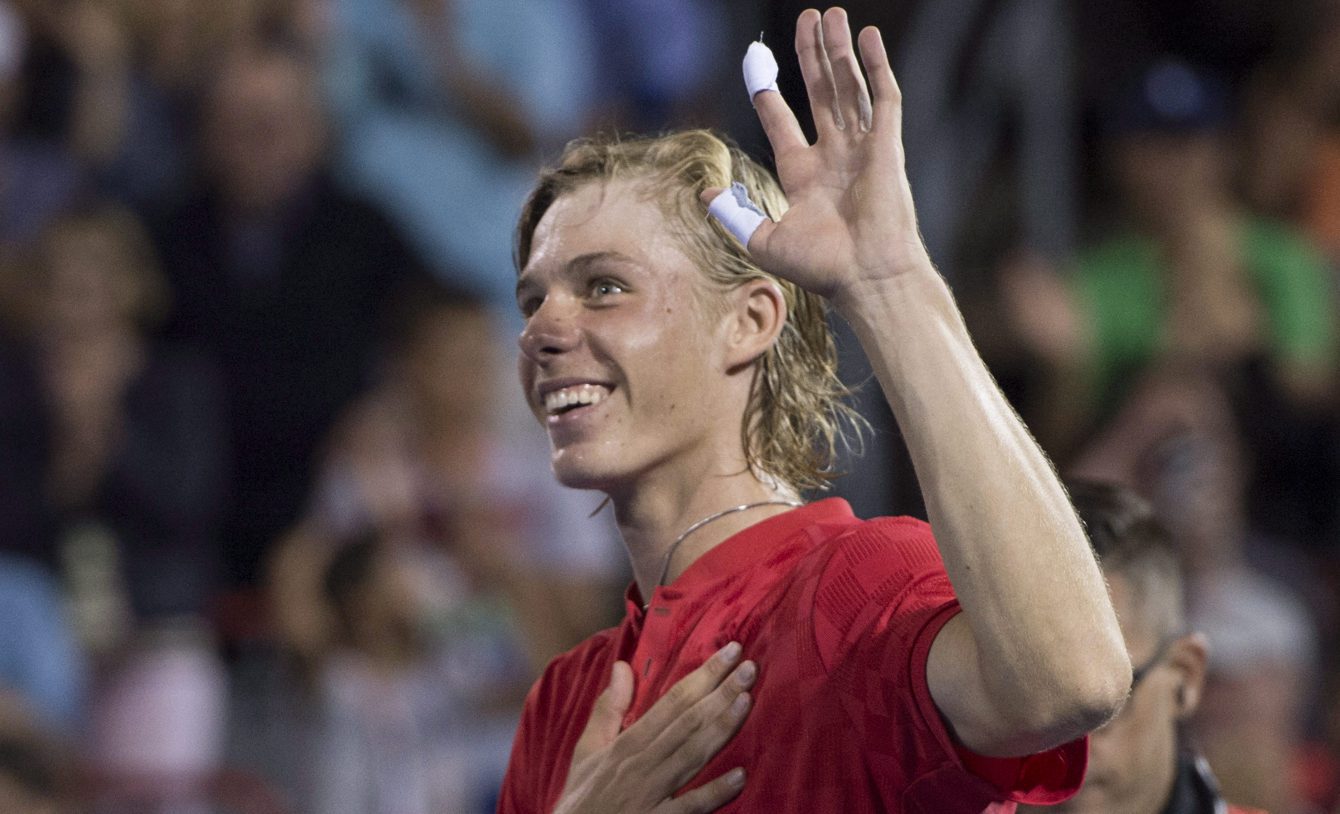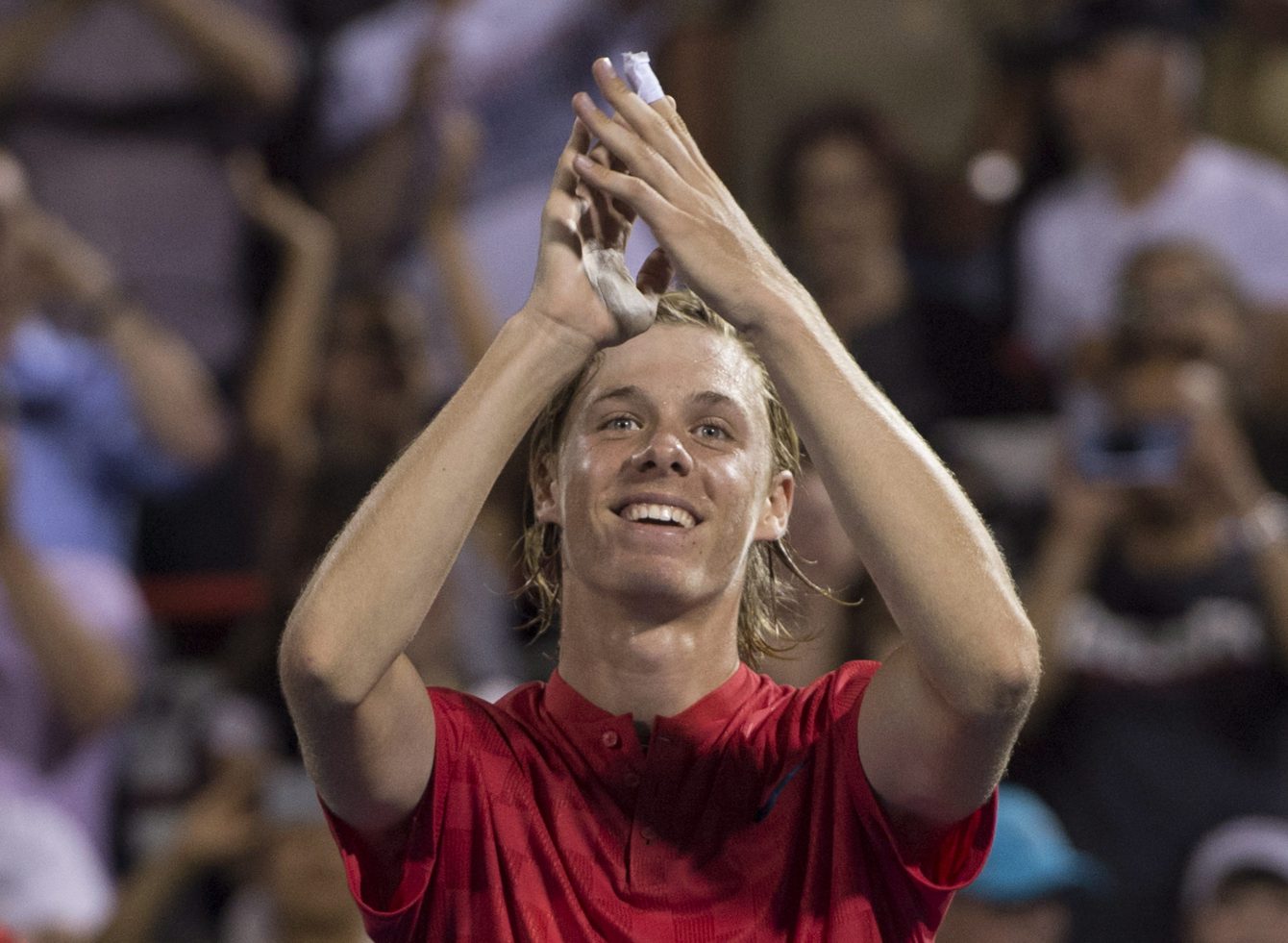By the numbers: How Shapovalov mirrors some of the best in tennis
Get ready to be impressed (if you weren’t already).
Denis Shapovalov’s memorable run in a star-studded ATP World Tour Masters 1000 tournament came to an end in Montreal on Saturday night at the hands of world number eight Alexander Zverev, but not before the Canadian made some significant strides in his tour rankings.
RELATED: Shapo’s resiliency | Shapo beats Nadal

Denis Shapovalov of Canada celebrates after defeating Adrian Mannarino of France during quarter-final play at the Rogers Cup tennis tournament Friday August 11, 2017 in Montreal. THE CANADIAN PRESS/Paul Chiasson
While 18-year-old Shapovalov will have made the jump to well inside the top 100 when the rankings are released next week, there are several other takeaways from his week of staggering achievements that puts him on par with some of the greatest names in the history of tennis.
By the numbers:
143 – Shapovalov’s tour ranking coming into the week
130 – Shapovalov’s career ranking high before this week
67 – Shapovalov’s projected ranking post-tournament
38 – The total age of Shapovalov and his semifinal opponent Alexander Zverev, the youngest ATP semifinal duo since Kei Nishikori versus Sam Querrey in 2008 at Del Rey Beach; youngest Masters 1000 semifinal duo since Rafa Nadal and Richard Gasquet in 2005 at Monte Carlo
18 – At 18 years, 119 days Shapovalov became the youngest-ever Masters 1000 semifinalist
6 – The number of total ATP World Tour wins Shapovalov had before beating 15-time Grand Slam champion Rafa Nadal, who has 853 wins
2004 – Shapovalov became the youngest player to reach a Masters 1000 Round of 16 since Rafa Nadal did it 13 years ago as a 17-year-old
1974 – Shapovalov became the youngest quarterfinalist at a Canadian Masters since an 18-year-old Bjorn Borg 43 years ago

Denis Shapovalov of Canada celebrates after defeating Adrian Mannarino of France during quarter-final play at the Rogers Cup tennis tournament Friday August 11, 2017 in Montreal. THE CANADIAN PRESS/Paul Chiasson
Those numbers above tell a story that puts Shapovalov in the same category as legends like Nadal and Bjorg, along with current tour stars such as Nishikori and Querrey when they were teenagers.
In jumping approximately 76 spots in the ATP rankings, Shapovalov will become the second highest ranked Canadian on tour behind 2016 Wimbledon finalist Milos Raonic, opening the possibility to enter more high profile tournaments in 2018 as this season winds down.

Alexander Zverev of Germany celebrates his victory over Nick Kyrgios of Australia during round of sixteen play at the Rogers Cup tennis tournament Thursday August 10, 2017 in Montreal. THE CANADIAN PRESS/Paul Chiasson
While Germany’s Zverev took advantage of Shapovalov’s errors typical of players his age to beat him in straight sets 6-4, 7-5 on Saturday, the two players’ progression adds further optimism for those watching Canadian tennis full time.
Two years ago, an 18-year-old Zverev ended the 2015 season ranked 83rd in the world making a jump of more than 40 spots from the previous year. In 2017, Shapovalov could potentially better Zverev’s feat. A year later, Zverev ended the 2016 season up to world no. 24 before becoming a top-10 player this year.
With Shapovalov’s remarkable resiliency, and his progress mirroring that of some of the game’s best players, Canadians can be rightly hopeful for a second global tennis star to join Raonic on the international stage in the not too distant future.
With research from Ariane Desrosiers


